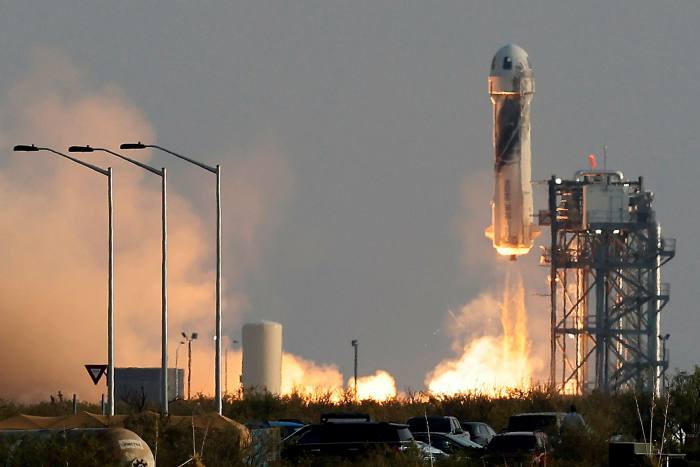The setting could be a bar or restaurant, but let’s go with a corporate box in a football stadium. Hedgies brush maki-roll crumbs off their gilets. Others booze. The host, who runs a trading desk at a bank, takes an interest in the match — the weirdo. The room’s net worth hovers around the billion mark when a drawn-looking 28-year-old enters.
A political aide, say, or a half-famous writer, he is the poorest person on the guest list. He is also the most in-demand. Some of the questions he fields are thoughtful. Some are transparent pretexts to meet him. Each guest will mention him to their spouse upon return to (one of) their homes. In his cramped flat, he will forget they exist.
Last week, Prince William, asked about the billionaire space race, joined the ranks of the confused and dismayed. Why do the earthly rich trouble the skies so? Megalomania can’t be ruled out. Intellectual curiosity — in Elon Musk’s case, at least — plays a role. There is also an element of benevolence in pump-priming what could become an industry of existential import.
None of this, though, gets at the secret dread of business people: being boring. None of it appreciates the lengths they will go to avoid the charge. That a moonshot is a bid for celestial dominion, I don’t doubt. But it is also, more plaintively, a bid for our interest.
Consider the strange plight of a big wheel in most industries. You can buy anything but the substance of your work bores a general audience. You employ thousands but you are less turned-to for your thoughts on the day than past-it playwrights (see the aftermath of 9/11). At some point, the gap between your wealth and your — what shall we call it? Cachet? — starts to rankle. It is, if you will, the Soho House problem. There are people in the one per cent who can’t join the private members’ club. There are hand-to-mouth graphic artists who are waved in.
The insecurity of the rich is hard to credit, I know. It is even harder to petition sympathy for. But its fruits surround us. Excruciating memoirs, paid-for seats at the political table: things that seem arrogant often spring from the opposite impulse. They are attempts by self-doubting people to be more than “just” commercial.
It is natural to think this urge is less acute in America, where entrepreneurs command awe, than in Europe, where it is still possible to mint a fortune to no social avail. But I wonder. Where is business’s patronage of “thought leaders” more lavish? Where but in Aspen is bogus brainstorming given more shrift? Not even in the US is moneymaking quite enough. Not while there is the hope of being interesting.
Looking back, the rocket men have always been working to that end: Jeff Bezos with the purchase of The Washington Post, Musk with the faux-profound interviews, Richard Branson with so many extramural pursuits that it is hard to remember what his core business is now. Space, with its existential questions, is the same project pushed to the nth degree. Each time, egotism is taken to be what drives them. That something more like vulnerability is at work is too fanciful to suggest.
There is no such thing as “the” elite. That maligned tribe is actually made up of two. There is the world of facts and numbers, which means business, including finance. The other is the world of symbols and ideas: politics, the arts, non-commercial law. Tech, with pretensions to the second group, belongs to the first. The media, though it mostly aims for profit, belongs to the second. Advertising, perhaps, can claim to hug the border. At mixed dinner parties, the business crowd, aware of the greyness of their work, and not always the best talkers, shrink almost into invisibility. On holiday, in their Valhalla-scale villas, they win hands-down.
The error is to think that all the chippiness is on the poorer side of the line. It drives them to resentment, yes, and progressive politics at best. It drives the other side to the heavens.
Email Janan at janan.ganesh@ft.com
Follow @ftweekend on Twitter to find out about our latest stories first


